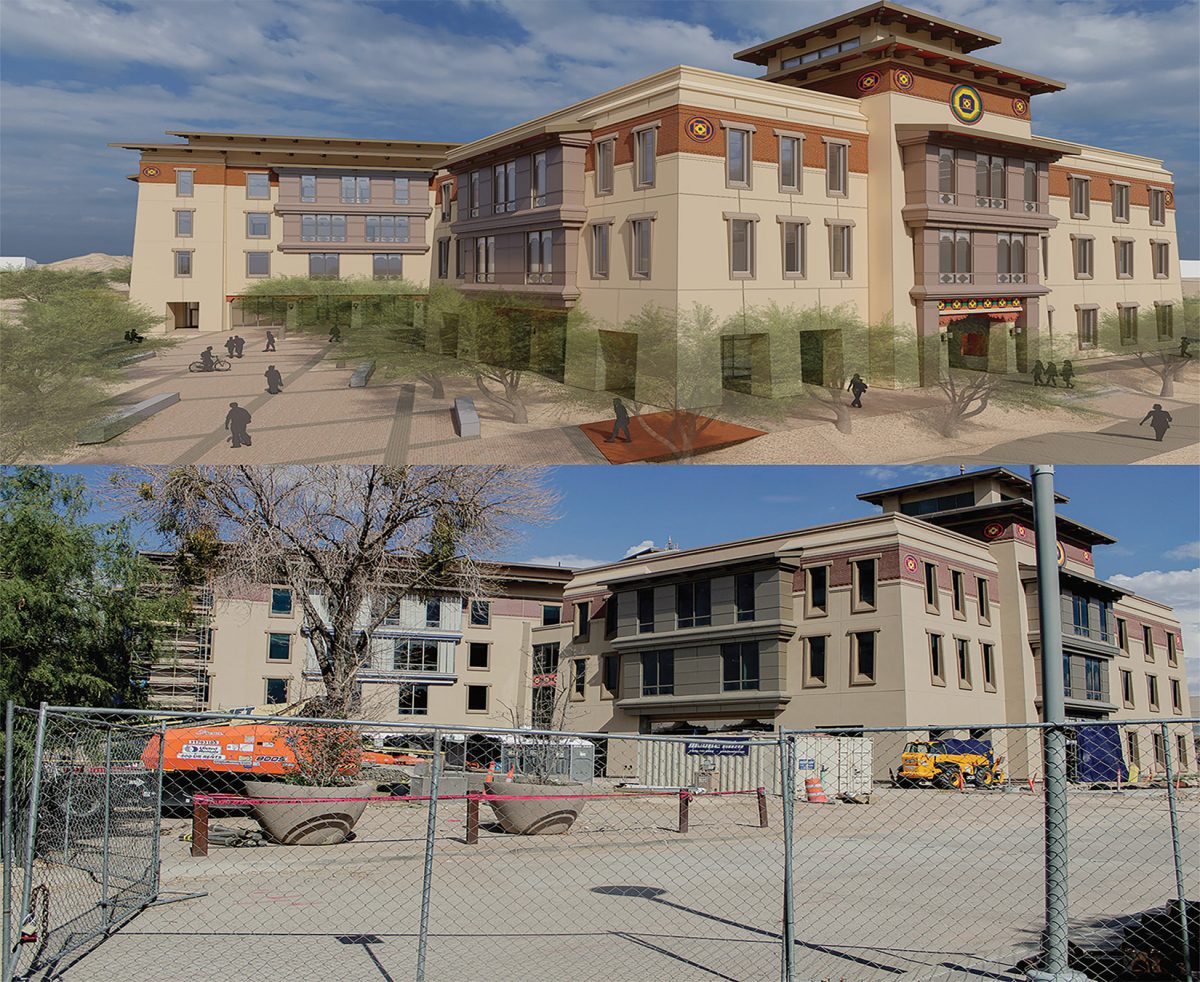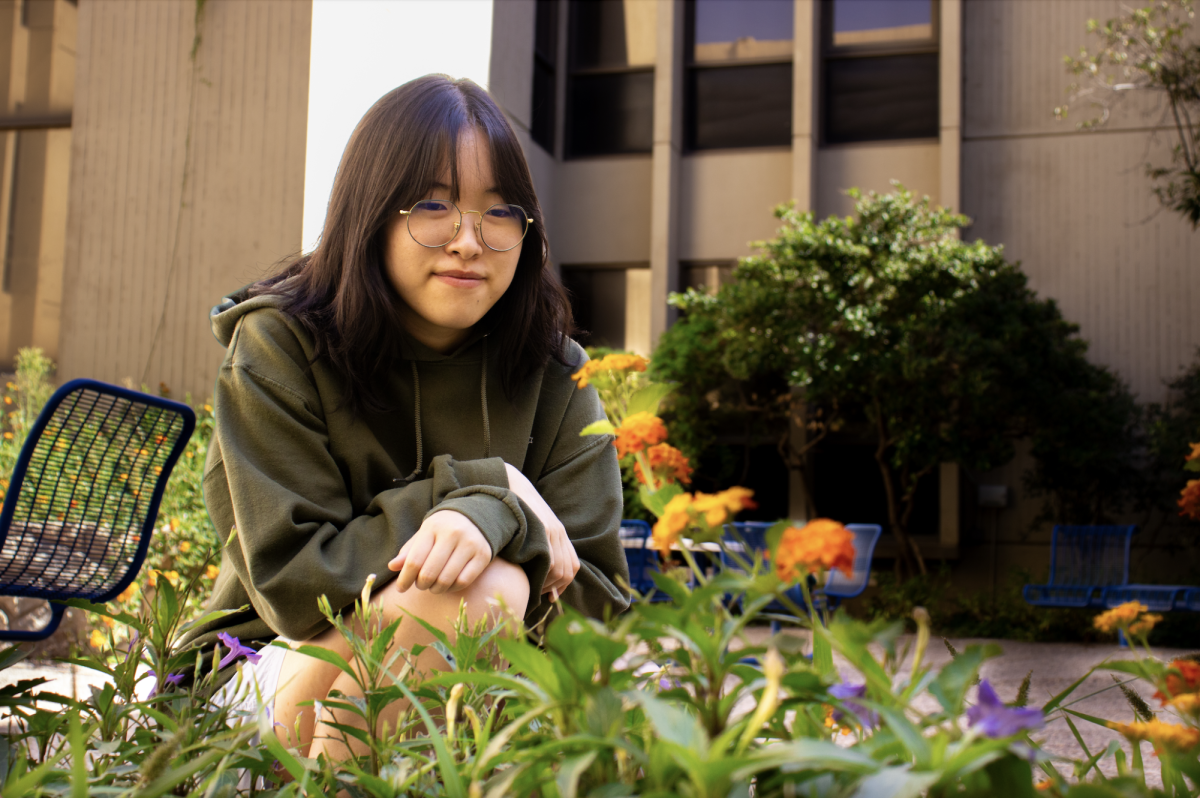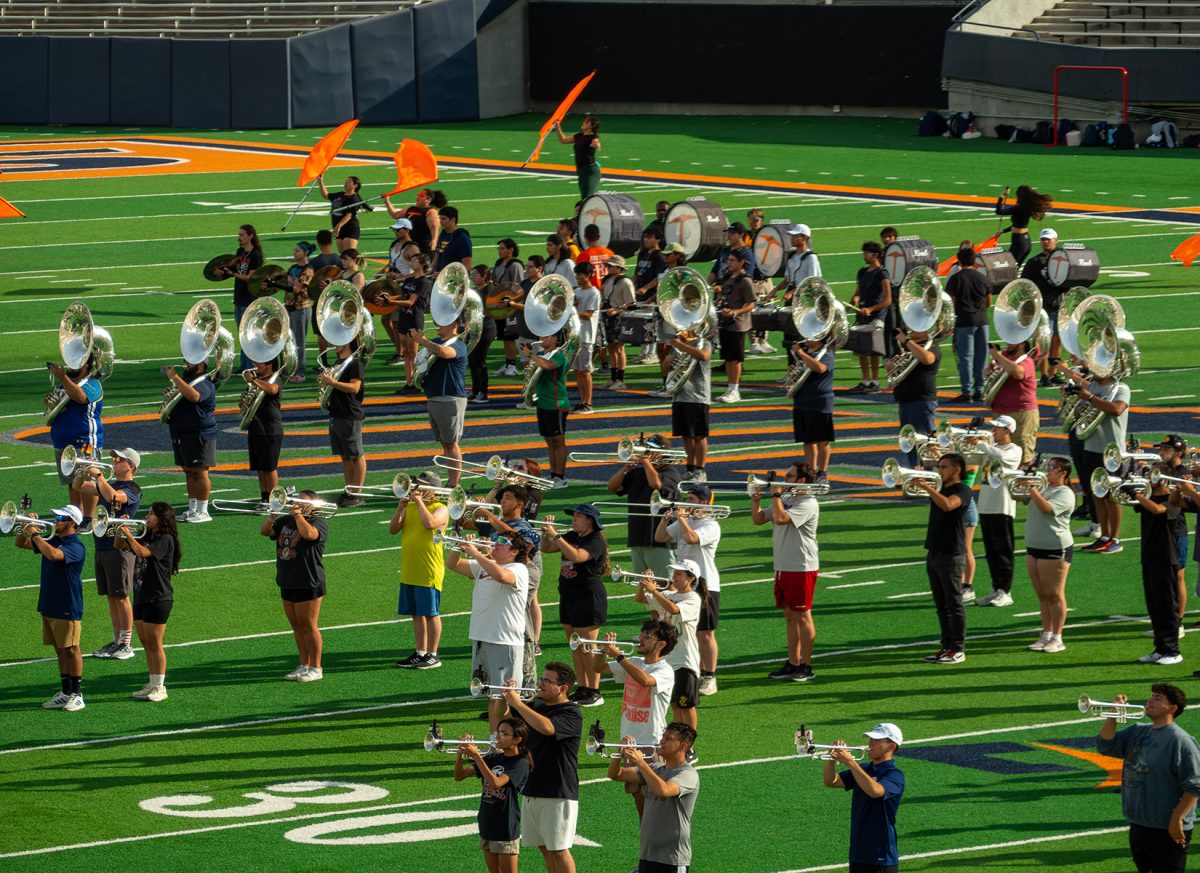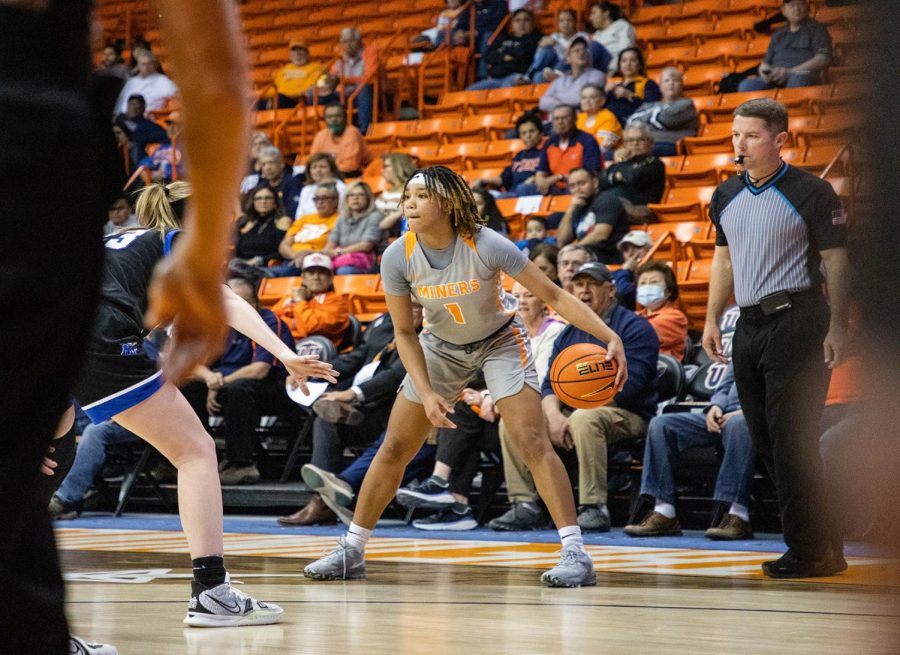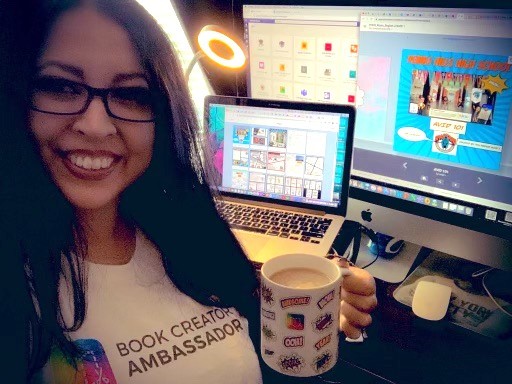
In March 2020, when time seemed to stop for many in the Sun City, countless educators were instead put in a race against it. Seemingly each passing moment leading up to the first week in which the semester would resume was spent meeting, evaluating, developing, and preparing for what would be a new frontier. While most people often assume that time off as an educator is a perk of leisure, the full extent of the time, work and energy put into preparing for this journey into uncharted territory overshadows all preconceived notions regarding how the school holidays were spent.
Two weeks after the beginning of El Paso’s lockdown, Pebble Hills High School’s first virtual classes were about to begin. In one instructor’s home for example, the blinds had been closed and there at the desk sat a small ring light, attempting to make up for the absence of morning rays of the sun. Although slightly overpowered by the shine of the light ring, a faint bluish glow emanated from the two computer screens and fell onto the face of the room’s occupant.
After nights of preparation, testing presentation links, and sending reminders out to students and parents, it was time for 39-year-old Hispanic-American Pre-AP English/ESL instructor, Sany Marie Romo, to meet with her first online class of the day. Although some worries of having connectivity issues lay at the back of her mind, an overall sense of anticipation was slowly forming inside her like a child on Christmas morning; anticipation at the idea of what possibilities this technology-based format could offer to the overall student learning experience.
In another passing conversation with Romo regarding the sense of anticipation with the digital learning environment, she states, “I finally felt like I was in my element… everything that I had ever learned, explored, and experienced all led me to this moment and I was thrilled that technology was not only being encouraged, but fully embraced.” Little did she know just how many opportunities that this virtual door would open to in the months to come.
During these months, it was a time of uncertainty in which standing together at a distance meant the preservation of the whole system, and it would be in this time where camaraderie in the education system in its entirety would finally become fully embraced. As an educator with prior experience in Career and Technical Education (CTE), this notion, along with her desire to continue her own educational endeavors, would inspire Romo to seek out further support that would serve to enhance the distance learning realm for her students. These supports consisted of attending online professional development training, webinars, and establishing membership affiliations with national technology-based organizations.
By participating in these trainings, through various fronts, Romo was given the chance to implement technology-based learning in a way that would permit for flexibility and differentiation within the digital learning environment. Throughout the course of the year, her students would enhance their own knowledge in the application of various platforms and would ultimately receive recognition for their project endeavors at the campus, district and national levels.
When reached out for further comment upon the benefits of this implementation of technology that has occurred in the past year, Pebble Hills High School’s Principal,Dr. Ignacio Estorga responded with the following:
“This is the era of technology. No longer are students learning from the old style “brick and mortar” but by blended learning. Through technology and through lecture students will become well rounded and ready to be successful in our society. Accessibility and use of technology are paramount for future success…All campus personnel have been impacted positively with the integration of technology in the classroom. We have become proficient in the use of various platforms, resources and media in order to facilitate successful and meaningful learning for our students.”
One of the campus’ Assistant Principals and the Director of Pebble Hills Early College High School, Gerardo Talamantes, was also kind enough to provide his response on the matter:
“Technology is becoming important in our daily lives. I believe that the pandemic accelerated the process in the integrations of technology. It has pushed our faculty, staff, students and community to use technology throughout their everyday teaching and learning…Ms. Romo has worked on her own classroom practices to aid her students and parents of the different platforms. She has also been key in developing professional development in a digital form for our teachers to continue to grow with best practices in their new virtual classrooms.”
A particular example that appears to accurately depict these statements in action comes in the form of Romo’s experience with the integration of a web-based platform known as ‘Book Creator’.
Through a free webinar that she had attended over the summer, Romo was given the opportunity to meet Leslie Fisher, a globally known K-12 EdTech conference presenter who spoke regarding an application called ‘Book Creator.’
After getting the chance to mess around with the web-based platform herself, the High School Pre-AP English teacher became intrigued by what the application could offer and was curious about what its incorporation in her own classroom might do for her sophomore students and their persuasive writing unit for the 2020-2021 academic school year. “The beauty that I saw is that it’s really a blank canvas,” she says, “so what can we possibly do with it?”
As the year progressed, she ended up introducing the platform to the rest of the Socorro Independent School District for a pilot. Through this collaboration with ‘Book Creator,’ Romo explains how the district was provided with a premium account that 40 of their educators would be ‘testing out’ in their own classrooms. Over the course of the pilot, she would participate in routine checkups with her fellow teachers and the technology vendor itself for the purpose of professional development. After about two months since the platform was first introduced, SISD was able to produce over 6,800 books by the estimated 700 students that participated in the pilot.
From that total, Romo reveals how some of her own students were able to personally benefit from this creative endeavor and expresses how some of them were able to create tutorial-based books on “how to work with Advancement Via Individual Determination (AVID) strategies, how to create the persuasive essay,” among other forms of analysis.
“We ended up sharing those with our feeder pattern,” she says, “and with that, students were able to safely get community service hours, but also share their voice and their knowledge with…people worldwide because that (Book Creator) actually is a platform where anybody can come across it.”
Alicia Gonzalez, another of Romo’s students, had even gained national recognition for her Book Creator project, which led to the opportunity for her to work in collaboration with another widely known platform, ‘Planet Classroom.’ Romo relays how Gonzalez had created an interview that spoke about “how to give back to the community” and “her experience within the pandemic.”
When reached for further elaboration on her experience, she expressed how grateful she was for the liberty that this creative writing project had given her as a writer. “I really enjoy when teachers give you freedom on what to compose/make,” Gonzalez says, “I was offered an opportunity! I am beyond grateful to receive that opportunity.” She goes on to describe what her collaboration with ‘Planet Classroom’ entailed, saying that she was asked to speak to users “around the world on how to compose a story” and had even participated in a competition where she chose to compose a one-page work based “on the mysterious appearance/disappearance of monoliths that have appeared around the world.”
“The fact that one little project that I was going to throw in the classroom for creative writing turned into a complete pilot for the district,” a quiet sense of awe washes over Romo’s features as she continues to speak. “That, I thought, was pretty incredible because teachers are wanting to be able to incorporate something (like Book Creator) into the classroom…I found that pretty awesome because we ourselves need to continue to be engaged and continue to learn something.”
Through the development of many other networks that would help her students and campus receive notoriety for their accomplishments, she was able to be personally recognized and appointed as an ambassador for three of the platforms that she integrated into the classroom. These of which included the technology vendors of Knowt, Schoology, as well as Book Creator.
However, that is not to say that all of this can be accomplished as easily as words can put it. Rather this educator’s long history and experience with technology and the field of education, as well as the presence of other influential factors in her life such as her daughter and a mentor from her own high school days, have all been able to build her up into the person that was able to leave such a profound mark in the application of technology in the classroom.
As a graduate from UTEP with a master’s degree in Education Administration, two bachelor’s Degrees in Business Administration, and Marketing and Management, as well as an Associate of Arts Degree in Business Administration, it is no wonder how well she was able to navigate working with various platforms and promote
technology-based learning to such a noticeable degree.
Additionally, by being in education for the past 13 years, as well as being versed in the technological aspects of this field for the past seven, this High School Pre-AP English/ESL teacher has been able to further develop the skills necessary to collaborate with others and the open eyes of many to some of the other new possibilities for the student learning experience.
When asked about a situation where she was driven by responsibility to complete a seemingly impossible task, Romo talks about how her integration of project-based learning at the
low-performing campus of Constance Hulbert Elementary was able to improve its level of academic performance in various subjects.
When initially provided with the opportunity to serve as a Grant Fund Site Coordinator for the 21st century Afterschool Program, Romo encountered what was to be an uphill battle to develop a program that was meant to extend the At-Risk students school days an additional three hours. The aspects of academic assistance, enrichment, college and career readiness and community/parental outreach were all central themes to the requirements of this program.
During her tenure with Constance Hulbert, Romo adopted the concept of project-based learning to further enhance the school day “as opposed to replicating it.” Partnerships were established with UTEP and EPCC to create digital media enhancements to support the area of English Language Arts, GECU to build on financial literacy and mathematics, a partnership with MicroSociety for real-world learning and more came into fruition.
Starting at a ranking of 37 out of 37 when it came to the State of Texas Assessments of Academic Readiness (STARR), by year three, the campus was ranked fifth in the district for gains in math and science, and third in the district for gains in English Language Arts. The benefits of this program not only propelled students toward academic achievements, but it additionally provided her staff of part time teachers and tutors to secure coveted teaching positions and career trajectories. Three of her part time teachers were hired on sight with Constance Hulbert, and one of them had even received the teacher of the Year recognition during their second-year teaching. Several of her part time tutors also ended up “involved in different aspects of mentoring” following their experience with this program.
As the conversation drew on, it was honestly a wonder to get to know what exactly it was that led her to develop the motivation necessary to become the extensively skilled and certified educator that she is today.
She relays that the field of education was something that she never really thought about when she was a student herself. For the longest time, her own background as an At-Risk student was something that appeared to prevent her from taking interest in a system that would only seem to turn its back on her for the identity that she did not even know it gave her.
However, a “chance encounter” during her freshman year of high school with the principal from the Ysleta Independent School District’s alternative school of Cesar Chavez was what it took to start a fire within her. Her name was Lilia Limon, and Romo describes working with her as the first time in which she felt that she was actually “being seen” by someone in the education system.
“She actually took the time to learn about myself,” she says, “(to) see where I was going, what my aspirations were… that pause for somebody to reflect on, it brought about, you know, some kind of courage that I would have to go ahead and finish high school.”
It was through these encounters with Limon would serve as the principle guiding factor for her to start looking beyond the label and at the person. However, she still had some doubts regarding the trends to regard students only by their status that often guided the educational system. “I rushed high school, to be perfectly honest, I graduated in three years” Romo expresses, just to be done with the system.
Later in life, already having acquired the value of ‘seeing’ others, Romo would be inspired to give back to this field when she herself became a parent of a child. At the time, Romo was majoring in Business Administration with a focus on Marketing and Management; however, it would be through the eyes of a parent that Romo’s career aspirations would change course. “I began to see that the educational system had a complete turn around and the teachers, I noticed, were taking an active interest in you,” referring to her daughter, Lennon.
This in turn inspired Romo to gain an interest in the field of education where she would begin to serve as a substitute teacher. “From then on, I fell in love with the career,” she says. Each step of her daughter’s educational journey led Romo to further expand upon her own. In the span of her career, she has obtained nine areas of certification with the state of Texas, all connected with her child’s experience and the desire to create the same foundation of support Limon had instilled in her.
Presently, while Romo is integrating technology in a way that serves to benefit her students academically, she can also be found attempting to unlock their own aspirations and interests through what she calls “Mental Health Days,” which take place at the end of each school week. Here, she allows them to, as she says, “have this openness, this dialogue, this opportunity for them to showcase something that maybe might not be seen on paper” by giving them the chance to interact with each other and share their personal interests, even if it is merely about a song that speaks of who they are. There is a faint glimmer in her eye as she talks about all this; a kind of spark similar to the one she had when she spoke of how it felt to be seen as a person herself. “I want to be able to get to know the student more than, you know, the name and number on the roster,” she explains.
During the recent teacher Appreciation Week, Romo received several E-Cards from current and previous students. A common thread that was noticeable within each message had students recognizing their teacher for the implementation of Mental Health Days. In particular, one of her Pre-AP English II students responded with the following:
“The best lesson that I learned from your class was actually a quote from Macbeth: I will fight like a man, and I will feel like a man. This quote helped me understand that it is OK to be strong, but it is also important to feel things as they are and not suppress those feelings. This is a lesson you also reinforce in your class, you gave us mental health days and checked in on us amid this pandemic. I’m really thankful for the help and encouragement that you’ve given me.”
To future educators, Romo advises to “put yourself in the place of the student and remember what it was like.” She explains how being able to understand where your students are coming from is something that should be taken into immense consideration in this field in order “to be able to support them (students) as individuals and be able to advocate for them and their needs.”
These Mental Health Days, along with the ability to participate in variety technology-based projects where creativity has been a highly encouraged factor, have served to improve both her Regular-Ed and Pre-AP students’ overall academic performance. “The students don’t necessarily feel pressure right now,” Romo says, speaking with regard to the feedback she’s received over their scores on various tests, “because of that…I’ve noticed that the scores have come in, and they are on par with our early college students,” a group that is “purely identified as the high-performing students.”
Romo goes on to speak of how her students have also shown improvement with even their writing composition and concept application skills, saying that, “they are actually able to give us different examples, whether they pull from literature, from pop-culture, from personal experience. So, they are able to have this kind of abstractness in their writing, and I think that it’s helped strengthen them as writers.”
Considering that this all took place during a year in which there was expected to be a decline in academic performance due to abrupt shift from in-person to virtual learning, it is important to consider how technology can be utilized in an academic classroom setting that continues to evolve through its models of student learning.
As shown through Romo’s work and accomplishments as an educator over the past year, it is essential for prospective educators in the UTEP community about to embark on this field to have the opportunity to familiarize themselves with tools beyond the textbook and internships. They must be inspired to trust their ingenuity and embrace creative exploration.
“Continue your growth,” she says, “if you’re going into this field where you’re trying to inspire all of these students to get an education, to have that foundation for future successes… (you) need to continue modeling that learning and be the advocate and the voice for all these changes we need to incorporate within the educational structure.”
As for the next steps for her own professional journey, Romo will soon be rejoining the UTEP community as she embarks on her second master’s degree. Her school district has provided her with the Dual Credit Scholarship to receive her MED in Curriculum and Instruction for Dual Credit Teaching and Learning with a certification in English Literature. She has also recently learned that she was admitted into the College Board’s Pre-AP Programs National Faculty where she will be teaching courses for Pre-AP English I and II this summer. In addition to this, Romo has also been tapped to join the CTE department to bring the Computer Programming endorsement to Pebble Hills High School. She will be teaching AP Computer Science, Fundamentals of Computer Science, Web Design and Video Game Design courses. The educational journey for this educator is far from ending.
As our conversation comes to a close, Romo leaves off with a note that seems to embody her strong sense of regard for the path she’s chosen, and is also something that should remain in the minds of those looking to go down a similar professional road:
“Being in the educational system is a blessing, and if you have that opportunity to come into our field and support them (students) and contribute to, you know, future generations of leaders, this in it of itself is an amazing thing and it’s rewarding in all fronts…It’s not just a job, it truly is a passion.”
Lennon Romo may be reached at [email protected]

